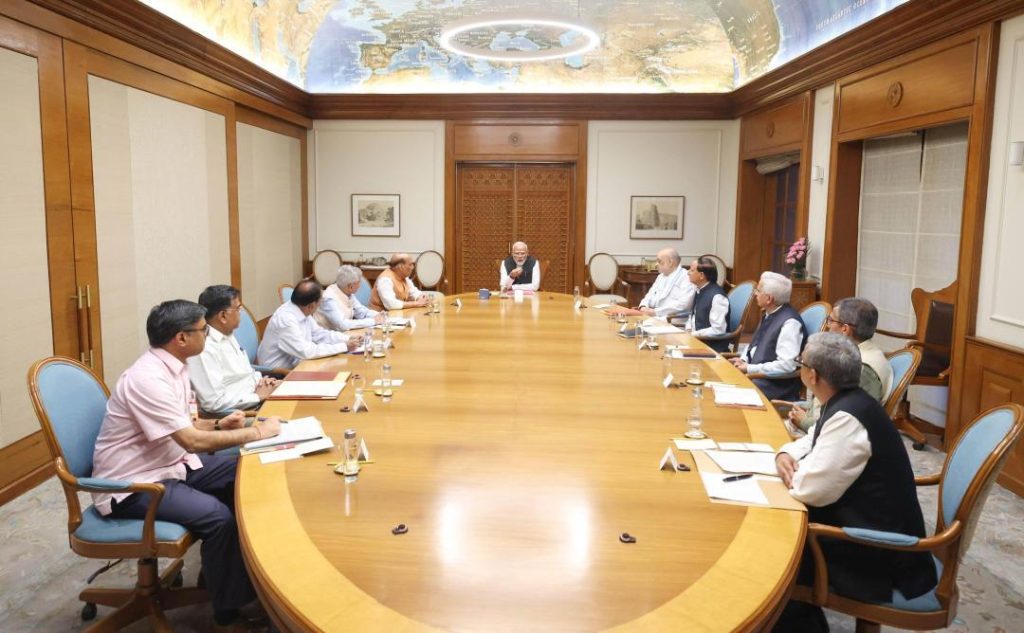
Top Level Meeting on Security Begins at PM Modi’s Residence, Day After J&K Terror Attack
In the aftermath of the horrific terror attack in Pahalgam, Jammu and Kashmir, which left at least 26 tourists dead, the Cabinet Committee on Security (CCS) held an emergency meeting on Wednesday at the residence of Prime Minister Narendra Modi. The meeting was attended by key officials, including Home Minister Amit Shah, Defence Minister Rajnath Singh, and National Security Adviser (NSA) Ajit Doval.
The meeting was convened to discuss the security situation in the country, particularly in Jammu and Kashmir, and to chalk out a strategy to tackle the growing threat of terrorism. The CCS meeting comes a day after the dastardly attack on tourists in Pahalgam, which was carried out by terrorists who infiltrated into the valley from Pakistan.
Home Minister Amit Shah, who had returned from Jammu and Kashmir on Tuesday evening, attended the meeting to brief the CCS on the ground situation. Shah is believed to have discussed the security measures being taken by the government to prevent such attacks in the future.
Defence Minister Rajnath Singh and NSA Ajit Doval also attended the meeting to discuss the military and intelligence aspects of the security situation in Jammu and Kashmir. The Defence Minister is believed to have briefed the CCS on the security arrangements in place along the Line of Control (LoC) and the measures being taken to prevent infiltration by terrorists from Pakistan.
The CCS meeting assumes significance as it comes in the wake of a series of terror attacks in Jammu and Kashmir, which have claimed the lives of many innocent civilians and security personnel. The recent attacks have raised concerns about the growing threat of terrorism in the country and the need for a robust security strategy to tackle it.
The Pahalgam attack, which was carried out by a group of terrorists who were reportedly armed with automatic weapons and explosives, is the latest in a series of attacks in Jammu and Kashmir. On October 8, a terror attack on a CRPF convoy in Pulwama killed 40 personnel, and on February 14, a terrorist attack on a bus in Pulwama killed 49 people.
The CCS meeting is believed to have discussed the need for a multi-pronged approach to tackle terrorism in Jammu and Kashmir, including strengthening of intelligence gathering, improvement of security infrastructure, and enhanced cooperation with the states and the Centre.
The meeting is also expected to have discussed the issue of cross-border terrorism, which is believed to be one of the main reasons behind the growing threat of terrorism in Jammu and Kashmir. The CCS is likely to have discussed the need for Pakistan to take concrete steps to prevent the use of its territory for terrorist activities.
The CCS meeting is a clear indication of the government’s commitment to tackling terrorism in Jammu and Kashmir and to ensuring the safety and security of the people of the state. The meeting is also a testament to the government’s determination to take all necessary measures to prevent such attacks in the future.
The Pahalgam attack has once again highlighted the need for a robust security strategy to tackle terrorism in Jammu and Kashmir. The CCS meeting is a significant step in this direction, and it is expected to pave the way for a multi-pronged approach to tackle terrorism in the state.
In conclusion, the CCS meeting at PM Modi’s residence, a day after the J&K terror attack, is a significant development in the country’s efforts to tackle terrorism. The meeting is a clear indication of the government’s commitment to ensuring the safety and security of the people of Jammu and Kashmir, and it is expected to pave the way for a robust security strategy to tackle terrorism in the state.
Source: https://x.com/airnewsalerts/status/1915027030753808585






